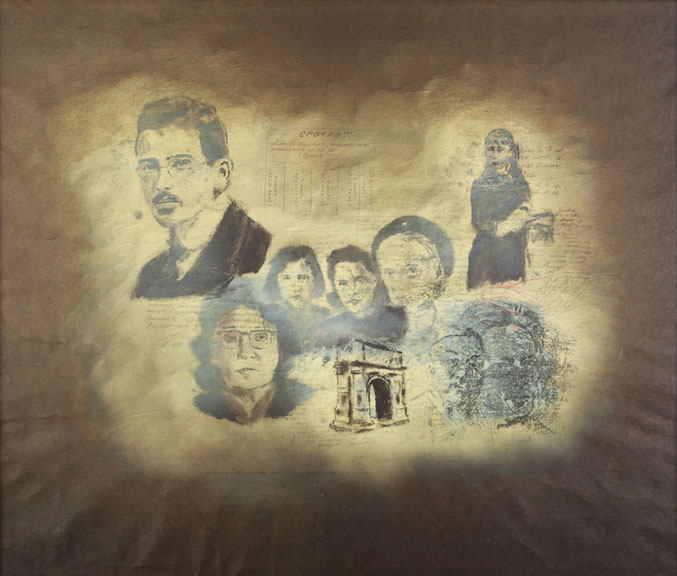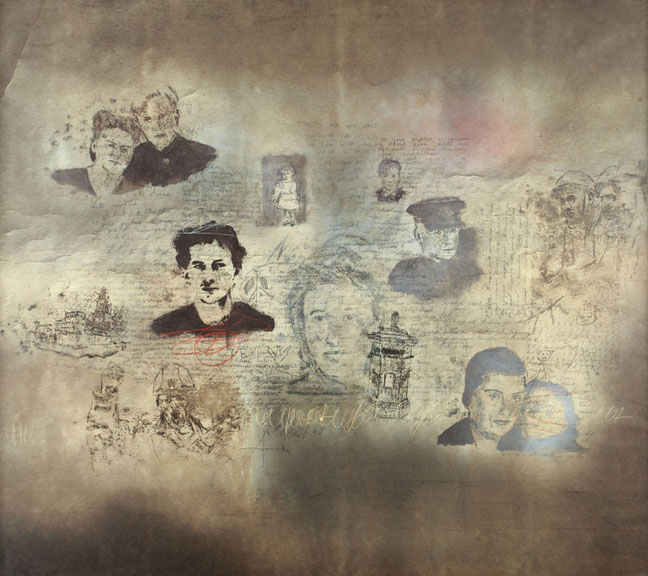Issue 4/2015 - Kiev, Moscow and Beyond
Our Common Struggle
Russia, Ukraine and the Role of the International Artistic Community
I will admit that being invited to the Kyiv Biennale provoked in me a very distinctive kind of ethical neurosis. I have a complicated, long-term history (and History) with Ukraine, both personal and, if you will, genetic. My ancestors lived in what is now the Vinnytsia Oblast, in Podolia, home to a Jewish community from the sixteenth century on. In the mid-seventeenth century, that community was very nearly destroyed by Cossacks under the leadership of Bohdan Khmelnytsky, celebrated to this day by a memorial sculpture in the center of Kyiv. As an eleven-year-old boy in 1941, my father, who had wound up with his parents in a Nazi-occupied Jewish ghetto, fled and spent more than two years on the run, hiding out in ditches and attics, until he was finally and happily reunited with his family in a partisan unit with whom he would go on to fight for nearly another year. At about the same age, in the mid-eighties, I left Russia’s northern heartland with my family and headed for Ukraine. I never had to hide in any ditches, but, as a Jew, my struggle for honor and dignity was a daily reality. I cannot, alas, forgive and forget, even after all the years that have passed. On the other hand, today I live and work in Russia, and have been invited to Ukraine as a “Russian artist” (though as an Israeli, I have something to say about the military invasion and occupation). The question is, how wide a latitude are artists invited from Russia given in critiquing the current situation – or, if you’d rather, what can and should an artist say in representing the aggressor nation without risking the accusation of a pro-Putin stance?
Let’s give the pro-Putin propaganda its due. Certainly, it kills several birds with a single stone. First of all, it sustains patriotism at the pitch this country requires. Second, it inflames Ukrainian resentment. As a matter of fact, Russia’s mass media do the work to both of these ends, leaving the Ukrainian opposition no move except to reduplicate the same discourse with its polarities reversed (this mirror relationship and its class nature require separate discussion elsewhere). Third and finally, Russia’s propaganda levels any critical discourse, manipulating successfully with its internationalist, anti-war, and antifascist rhetoric. What matters about this rhetoric, which is totally divorced from reality, is more than just its media nature. It’s a good example of what Alain Badiou in his Ethics calls “the simulacrum,” beneath which evil is concealed – an appropriation by reactionary forces of the language of revolution. In Russia, the artist, the activist, the intellectual is caught in a double bind. Any critical statement is immediately absorbed by official rhetoric on the one hand, and is rejected and harshly condemned as such on the other. Looking at it this way, it is only natural that a question immediately arises about the fundamental possibility of any kind of critical statement. Indeed, it is my duty to demand peace without annexations or reparations – an immediate, bilateral ceasefire, the withdrawal of all Russian military units from Ukraine. These demands will have a different weight and color coming from me than they would from the television. But don’t I also have a duty to speak openly about social injustices in Ukraine – about nationalism, anti-semitism, and the trafficking of women? I address this question not just to myself, but to my Ukrainian comrades as well. My answer is yes. This is our common duty, our calling. This is the place of the true ethical turn – from an ethics founded, in Badiou’s language, on “the right of nonviolence” to an “ethics of the event.”
In one of the actions he staged in the heat of World War I, Karl Liebknecht perfectly articulated a crucial principle of revolutionary struggle: The primary enemy is the one within our own borders! The war in eastern Ukraine is one simultaneously imperial and civil. It is a war unleashed and supported by the ruling elites of both countries, aimed not just to seize control of the region, but also to suppress all protest movements in the two nations. It is no coincidence that in Ukraine, harsh anti-Russia rhetoric is often accompanied by equally aggressive programs of decommunization. Nor is it any wonder that the war is raging in exactly the region of Ukraine traditionally home to the elite of the working class – workers in major factories and miners, with a glorious tradition of revolutionary struggle. These are the people today driven to desperation by poverty, unemployment, social inequality, and now also war. To declare them separatists, terrorists, would represent the same violence against truth as declaring the remaining portion of Ukraine fascists. The very fact of the war’s transition on both sides into channels of national liberation and patriotism speaks to the unity of policy objectives on both countries’ parts. No less real a threat to Ukraine is posed by the Ukrainian government itself, which could always use the war as a pretext to declare a domestic state of emergency.
Today, Ukraine is enduring a difficult, tragic period. I am convinced, however, that the situation of war also presents Ukraine with a historic opportunity to free itself from resentment. Resentment that is pure grievance. That leads to self-pity. The feeling that one is a victim. And this feeling can be absolutely genuine and sincere – in a time of occupation, of war, of mass terror. In other words, in a real emergency, like the one that exists today in Ukraine. But pity – most especially self-pity – serves us ill. There is only one person more dangerous than an executioner who believes the rule of force grants him impunity: the victim whose crimes are absolved by the rule of weakness. Independence should be understood not as the restoration of national unity, but rather as the creation of a new international community founded on principles of justice and equality. To this end, let Ukraine look on itself with the eyes of the angel of history and mourn its own ruins. Working through the past requires painful exertion. Propagandistic defamation needs to be understood in decisive opposition not to total abnegation, but in fact quite the opposite – to open acknowledgement of one’s own problems and constant reflection. This is no easy task. Ukraine is offered by its history a confused tangle of trauma, violence, and the struggle for liberation. In my view, unraveling this tangle requires first and foremost an international community of artists. A truly international one, without false borders or suspicions. This requires no meddling in Ukraine’s domestic affairs. I say again, this struggle is ours collectively. Otherwise, abnegation and dissociation will lead to the materialization of the ideological phantoms created by Russia’s mass media.
Translated from Russian by Ian Dreiblatt
Translated by Helen Ferguson

